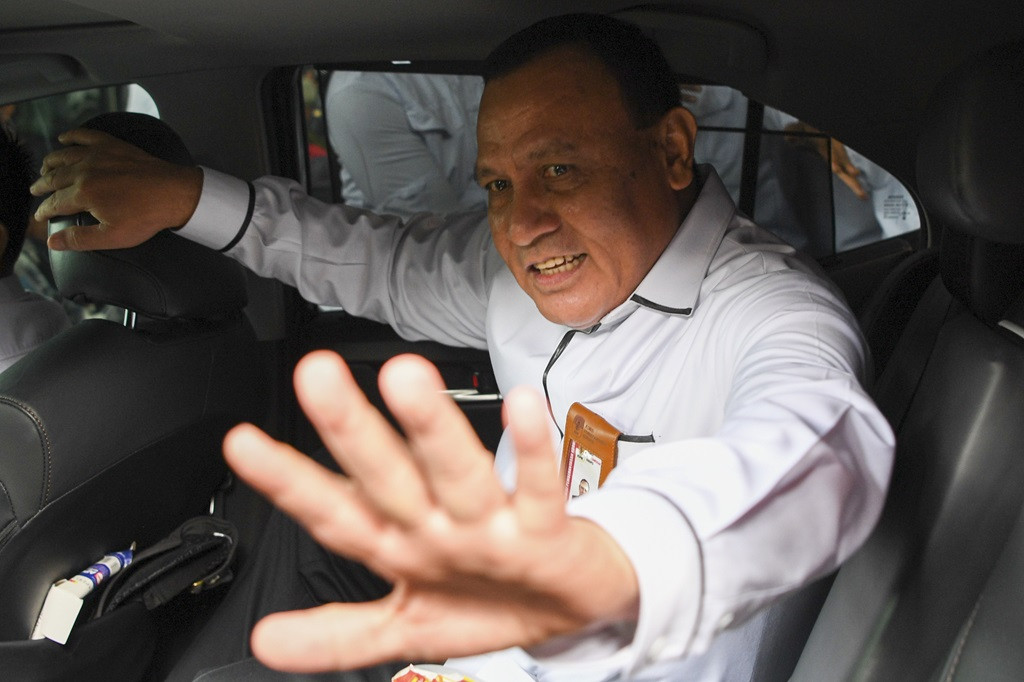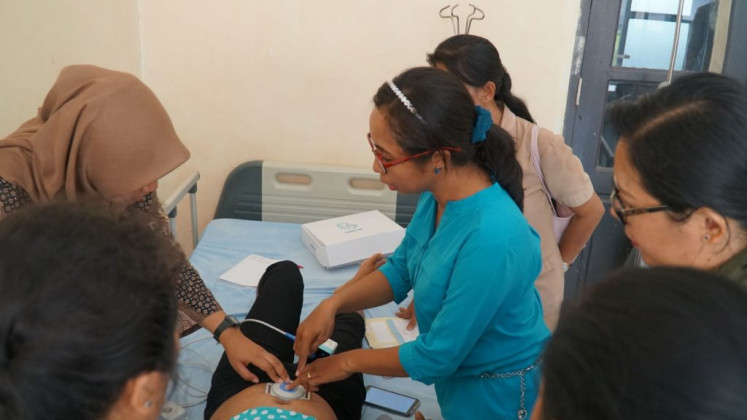Popular Reads
Top Results
Can't find what you're looking for?
View all search resultsPopular Reads
Top Results
Can't find what you're looking for?
View all search resultsReviving the KPK
Firli’s arrest serves as yet another grim reminder that the system we have been relying on to combat corruption may itself be corrupt.
Change text size
Gift Premium Articles
to Anyone
 Then-Corruption Eradication Commission (KPK) chief Firli Bahuri sits in his car after an ethics questioning by the antigraft body's supervisory council at the KPK's Anticorruption Learning Center (ACLC) building in Jakarta on Nov. 20, 2023. The supervisory council questioned Firli about his meeting with then-Agriculture Minister Syahrul Yasin Limpo, who was later named a graft suspect by the antigraft body. (Antara/M Risyal Hidayat)
Then-Corruption Eradication Commission (KPK) chief Firli Bahuri sits in his car after an ethics questioning by the antigraft body's supervisory council at the KPK's Anticorruption Learning Center (ACLC) building in Jakarta on Nov. 20, 2023. The supervisory council questioned Firli about his meeting with then-Agriculture Minister Syahrul Yasin Limpo, who was later named a graft suspect by the antigraft body. (Antara/M Risyal Hidayat)
T
he removal of Firli Bahuri from his post as Corruption Eradication Commission (KPK) chief after he was charged with extortion is, on the whole, no cause for celebration, even though he is being held accountable for his leading role in the antigraft body’s loss of credibility over the past years.
Instead, Firli’s arrest serves as yet another grim reminder that the system we have been relying on to combat corruption may itself be corrupt. That Firli managed to cling to power as long as he did, despite an earlier series of serious ethics violations, only supports this premise.
The case against Firli, who is accused of demanding money from former agriculture minister Syahrul Yasin Limpo, demonstrates the paradox of the country’s fight against corruption: Law enforcement officials, for the sake of wealth, break the very laws they are responsible for upholding. The Firli case is the epitome of this irony; he is the first antigraft leader in the history of the KPK to face graft charges.
The police began their investigation into Firli after Syahrul filed a report accusing the then-KPK chairman of attempting to extort him, in an apparent effort to fight back after the commission declared the NasDem politician a graft suspect.
In their search of Firli’s houses in Bekasi, West Java, and Kebayoran Lama, South Jakarta, the police discovered evidence that they used to arraign Firli, including foreign exchange receipts in Singapore and US dollars from money changers worth Rp 7.4 billion and dating from February 2021 to September 2023.
Firli is now challenging the Jakarta Police’s charges in court. A pre-trial hearing is slated for Dec. 11, but whatever the verdict, the damage to the KPK’s reputation has been done, and it will take a Herculean effort to restore it.
Even before the extortion case, the KPK was facing a trust deficit, and Firli’s contribution to this is hard to understate. As the commission’s head, he was found guilty by an internal ethics committee of displaying a hedonistic lifestyle by chartering a helicopter for private use, and as a KPK deputy he violated the code of ethics on multiple occasions by holding meetings with persons under KPK investigation.
Under Firli’s leadership, Indonesia’s corruption perception index rating fell to 34 in 2022 from 38 the year before. A lower score indicates greater perceived corruption, and the 2022 figure was Indonesia’s lowest since 2015, although for the past decade it has consistently performed poorly in the index.
President Joko “Jokowi” Widodo has named Nawawi Pomolango, who was previously a deputy KPK chief, as the interim leader of the institution until a definitive head is elected. After his inauguration on Monday, Nawawi pledged to help the KPK regain public confidence.
We admire his intentions, but modestly reconfiguring the KPK leadership will do little to revive the nation’s fight against corruption. Any effective strategy will start with a much broader effort to select honest, upright people to uphold the law.
Firli’s criminal charges offer a lesson to policymakers on the importance of credibility when it comes to corruption eradication. From the beginning, Firli’s nomination was fraught with controversy over his track record, but the government and the House of Representatives turned a blind eye to the red flags.
Instead, the KPK under Firli appeared to receive the full support of the political establishment. One indication was the extension of Firli and other KPK leaders’ terms in office from four to five years through a Constitutional Court ruling, just as the country was gearing up for a presidential election.
Nawawi and other KPK leaders will be unable to live up to the public’s expectations unless far-reaching KPK reforms are carried out. But fundamentally, the current government has never wanted a strong KPK and will drag its feet on any initiatives to fix the institution. It falls, then, to the next government to restore the KPK to its former legitimacy and carry it forward to greater success.










